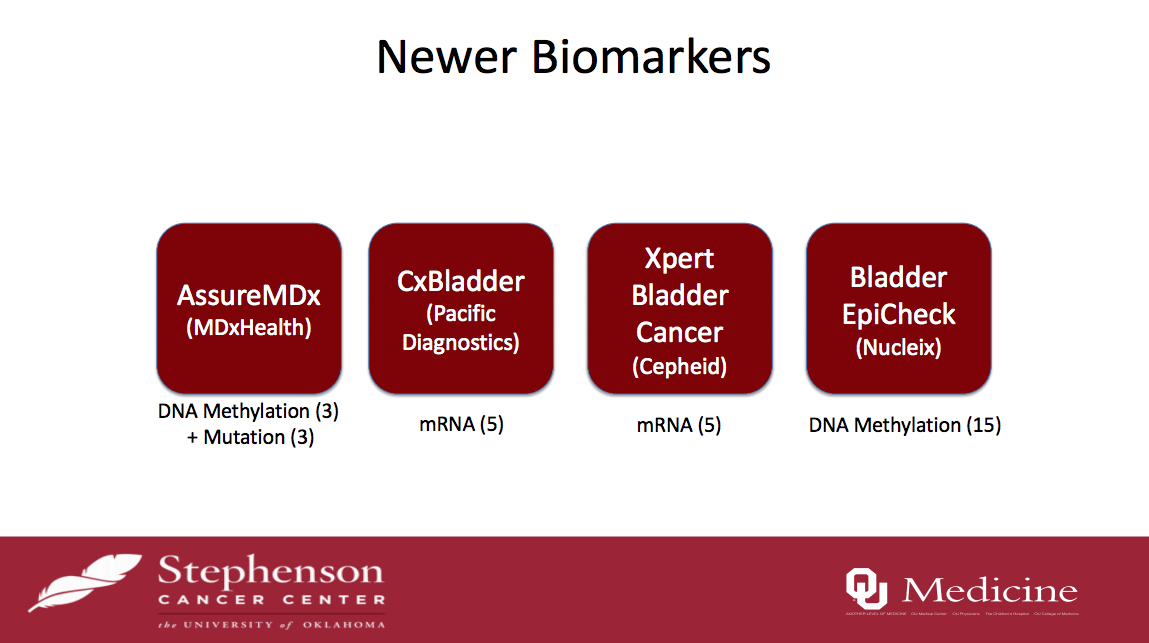Sanjay G. Patel, MD, presented “Urinary Markers in NMIBC: What’s New?” during the 3rd Annual International Bladder Cancer Update on January 23, 2019 in Beaver Creek, Colorado.
How to cite: Patel, Sanjay G. “Urinary Markers in NMIBC: What’s New?” January 23, 2019. Accessed Nov 2025. https://grandroundsinurology.com/urinary-markers-in-nmibc-whats-new/
Urinary Markers in NMIBC: What’s New? – Summary
Sanjay G. Patel, MD, defines challenges in the detection and surveillance of bladder cancer when using FDA-approved biomarkers. He then evaluates newer DNA methylation- , DNA mutations- , and mRNA-based biomarkers and their ability to account for the limitations of traditional markers.
Abstract:
The diagnosis and surveillance of bladder cancer predominantly relies on the use of cystoscopic evaluation in the clinic/operating room setting. However, cystoscopic evaluation has its own limitations, such as operator dependence, invasiveness, and difficulty in adequate bladder evaluation in the context of inflammation, small tumor, or carcinoma in situ. Urinary biomarkers have the potential to further inform diagnosis, risk stratification, and prognostication of patients with bladder cancer.
Traditional FDA-approved available biomarkers also have limitations, namely worse specificity compared to urine cytology, with modest improvement sensitivity. Newer urinary biomarkers rely on DNA methylation, DNA mutations, and mRNA. These show promise, and may better guide clinical decision-making in the diagnosis and surveillance of bladder cancer.
This presentation will review the performance and indications of historically FDA-approved, cell-based and protein-based biomarkers, comparing them to the newer biomarkers for patients with bladder cancer.
About the International Bladder Cancer Update
The International Bladder Cancer Update (IBCU) is an annual one-day CME conference focused on bladder cancer treatment updates. IBCU takes place during its sister conference, the International Prostate Cancer Update (IPCU). The conference’s faculty consists of international experts, and the event caters to urologists, urologic oncologists, and other healthcare professionals. In addition to didactic lectures, IBCU features interactive discussions, a panel roundtable, debates, and case presentations. Dr. Patel presented this lecture during the 3rd IBCU in 2019. Please visit this page in order to learn more about future IBCU meetings.
ABOUT THE AUTHOR
Sanjay G. Patel, MD, completed his undergraduate training in Biomedical Engineering at
Vanderbilt University. He proceeded to complete medical school at Vanderbilt University in
Nashville, Tennessee, and urologic surgery training at Vanderbilt University Medical Center. After
completing a Society of Urologic Oncology Fellowship at the University of Chicago, he joined the
faculty as an Assistant Professor in the Department of Urology at the University of Oklahoma in Oklahoma City.
Dr. Patel treats all urologic cancers (adrenal, kidney, ureter, bladder, urethra, and testicular
cancer) utilizing open, laparoscopic, and robotic surgery techniques. He has a particular interest
in the use of minimally invasive robotic approaches to treat urologic malignancies and has
extensive robotic surgery experience. He oversees the Bladder Instillation Clinic, where patients’ bladders
are directly treated with immunotherapy and chemotherapy to treat superficial bladder cancer. He is also developing techniques to perform intracorporeal robotic urinary diversions,
where he is using minimally invasive robotic techniques to create bladders out of the
intestinal tract.
Dr. Patel works with the Department of Engineering at the University of Oklahoma to develop novel diagnostic and therapeutic technologies to treat urologic disease. He also has an interest in genetic and molecular profiling of cancers, and how that kind of profiling can be used to guide treatment of urologic cancer.




